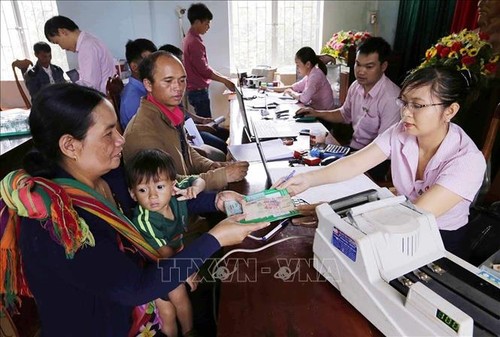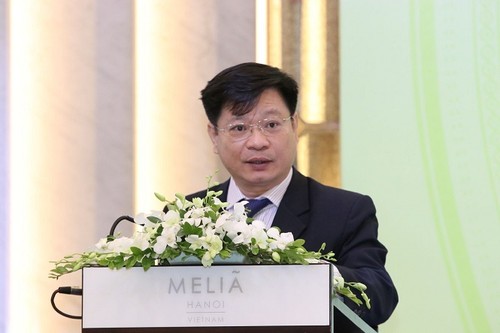 (Photo: VNA) (Photo: VNA) |
In Vietnam, the social security system is based on the pillars of sustainable poverty reduction; vocational training, labor and employment, social insurance, health insurance, and other types of insurance, and social protection and basic social services.
Achievements of Vietnam’s social security system
In recent years, Vietnam has made important strides in improving institutions to expand social security coverage with the ultimate goal of covering all citizens by social security throughout their life. Under the Vietnam Socio-Economic Development Strategy 2021-2030, Vietnam aims to become a high-middle-income country by 2030 and a high-income country by 2045.
Vietnam has raised pensions 7.4% and the benefits of social insurance allowance and monthly allowance as of January 1, 2022. In 2020 and 2021 when the COVID-19 pandemic was raging, the Government adopted several unprecedented policies and resolutions and used the Unemployment Insurance Fund to help employees and employers overcome difficulties.
 Bui Ton Hien, Director of the Institute for Labor and Social Sciences of the Ministry of Labor, Invalids and Social Affairs (photo: tapchicongsan.org.vn) Bui Ton Hien, Director of the Institute for Labor and Social Sciences of the Ministry of Labor, Invalids and Social Affairs (photo: tapchicongsan.org.vn) |
Bui Ton Hien, Director of the Institute for Labor and Social Sciences of the Ministry of Labor, Invalids and Social Affairs, said: "Vietnam completed many millennium goals ahead of schedule; improved its human development index, contributed to socio-economic development, protected the environment and strengthened social welfare to improve people's lives. The system of social policies is comprehensive, ensuring the people's social security rights. Poor and disadvantaged people receive regular support from the State. The social service system has been improved, ensuring people’s right to education, health care, housing, clean water and information."
Vietnam has obtained encouraging results in strengthening social security which have been internationally recognized, including achievements in hunger eradication, poverty reduction, education, and health care. In the Human Development Report (HDR) of the United Nations Development Program (UNDP) in Vietnam, Vietnam's Human Development Index (HDI) value was 0.703 in 2021, up two places in the global rankings to 115th of 191. The Population Living Standards Survey 2021 of the General Statistics Office also showed that Vietnam’s multidimensional poverty rate was 4.4%, down 0.4 percentage points from to 2020. Vietnam's poverty rate fell steadily between 2016 and 2021, with an average annual reduction of 1 percentage point.
Vietnam aims to build a sustainable, comprehensive social security system
Vietnam's social security is expected to face many difficulties and challenges due to global risks, environmental problems and demographic pressure as a result of rapid population aging. This will profoundly affect the economy, the labor market, and people's living standard.
Vietnam intends to reform the social security system to make it comprehensive and sustainable. Mr. Hien again: "We aim to achieve universal social security and cover the missing middle who are low income but not classified as poor or near poor. To improve their living standard, they need social support and investment in jobs. Investing in this group enables them to develop along with national development and realize their aspirations to grow. Identifying challenges of social policies requires new, comprehensive, breakthrough approaches and priorities."
Vietnam’s development orientation until 2030 is clearly stated in the Resolution of the 13th National Party Congress, which emphasizes the need to implement social policies, ensure social security, welfare and human security, create drastic changes in social development management, realize social progress and justice, and improve the quality of people's lives and their happiness.
To accomplish these goals, Vietnam aims to build a multi-tiered social security system to increase social security coverage, improve social security benefits, and reduce gender disparity in implementing social security policies. Vietnam's social security system will be based on a lifecycle approach to become sustainable, inclusive, shock-responsive, and gender-sensitive, ensure rapid national development and leave no one behind.